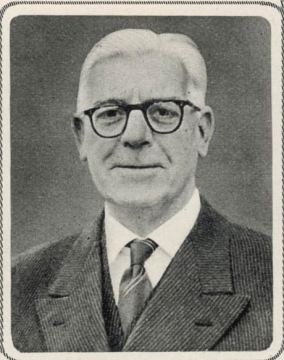C. J. Geddes
( trade unionist) | |||||||||||||||
|---|---|---|---|---|---|---|---|---|---|---|---|---|---|---|---|
 | |||||||||||||||
| Born | 1 March 1897 | ||||||||||||||
| Died | 2 May 1983 (Age 86) | ||||||||||||||
| Nationality | British | ||||||||||||||
British trade union leader who later was knighted
| |||||||||||||||
Charles John Geddes, Baron Geddes of Epsom was a British trade unionist who later was knighted. In 1955, he was President of the Trades Union Congress and President of the Postal, Telegraph and Telephone International.
Early Life
Born in Camberwell, London, his parents were active socialists in the Labour movement at a time that the Labour party was being founded in London. Charles attended Blackheath Central School but left still aged only thirteen. He joined the Post Office in 1911 as a boy messenger, running errands. In his spare time he worked for a shopkeeper in Deptford, East London where he first came into contact with the Post Office Workers Union.
He was a fighter pilot in the Royal Flying Corps during World War I, being commissioned a pilot officer in 1918.
On returning to civilian work, Geddes became active in the new Union of Post Office Workers rising to district chairman of the London district of the union's council. During the Second World War he was appointed assistant-general secretary of the UPW. He was Deputy General Secretary of the union from 1941, and then General Secretary from 1944 to 1957. In 1946 he joined the board of the TUC.[1] He ruled on shipbuilding and engineering disputes for the Attlee government. He referred wage claims to and impartial body before the establishment of ACAS. Geddes became authoritative and knowledgeable about the extent and scope of industrial disputes. In 1955, he was President of the Trades Union Congress.[2]
Appointed a Commander of the OBE in 1950,[3]
In 1957, Geddes was offered a Knighthood by the Macmillan government, he accepted, and then promptly resigned his position in UPW.[4]
On 4 August 1958, he became the third life peer created by letters patent under the Life Peerages Act 1958, with the title Baron Geddes of Epsom, of Epsom in the County of Surrey,[5] and was introduced on 22 October. He argued strongly in his maiden speech for extending protection of old age pension schemes. He praised the plucky Londoners who had defended the country during the Blitz, suggestive of the man in the boiler suit, a kind of community socialist. Geddes was not especially happy in the Lords which involved much complicated legal procedure and conventional rules.[6] Being a Keynesian he verged on a strongly unionised planned economy that was more socialist than mixed. He proposed round table negotiations with employers as a way of reducing unemployment. This new approach presaged the Wilsonian bureaucracy that attempted to modernise and improve productivity. Incentivisation was intrinsic argued Geddes, so that workers could share in economic benefits. In 1963 he told the Macmillan government that more investment was required in the Post Office.[7]
Events Participated in
| Event | Start | End | Location(s) | Description |
|---|---|---|---|---|
| Bilderberg/1955 September | 23 September 1955 | 25 September 1955 | Germany Bavaria Garmisch-Partenkirchen | The third Bilderberg, in West Germany. The subject of a report by Der Spiegel which inspired a heavy blackout of subsequent meetings. |
| Bilderberg/1956 | 11 May 1956 | 13 May 1956 | Denmark Fredensborg | The 4th Bilderberg meeting, with 147 guests, in contrast to the generally smaller meetings of the 1950s. Has two Bilderberg meetings in the years before and after |
References
- ↑ "Obituary: Peacemaker of the TUC", The Guardian, 4 May 1983
- ↑ https://web.archive.org/web/20120930102717/http://www.tuc.org.uk/extras/Congresspresidents.pdf
- ↑ https://www.thegazette.co.uk/London/issue/38929/supplement/2785
- ↑ https://www.thegazette.co.uk/London/issue/41134/page/4379
- ↑ https://www.thegazette.co.uk/London/issue/41465/page/4896
- ↑ The Times, obituary, 'Lord Geddes of Epsom: Force for Moderation within the TUC', 4 May 1983.
- ↑ HL, Hansard, 26 February 1963, col 53.